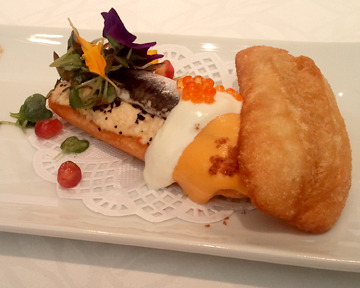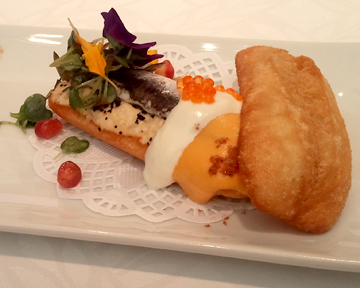Avant-Garde Cooking At Madrid Fusión 2012
The most notable chef at this year's edition, the 10th annual, of Madrid Fusión — the big international gastronomic "summit" held every January in the Spanish capital — is notable for his absence: Ferran Adrià. The legendary Catalan chef has been a staple here since the beginning, and he has used his forum at the event to make big announcements. It was here, in 2010, that he revealed his plans to shutter elBulli as a restaurant, reopening it as a culinary foundation sometime in 2014; and it was here last year that he gave the food world an advance peek at what the foundation was going to look like, through an audio-visual presentation in conjunction with his architect, Enric Ruiz-Gelí.
This year, Adrià is nowhere to be seen, and nobody's even quite sure where he is. Traveling in Asia? Supervising the groundbreaking for the foundation (originally announced for this month)? Just sitting somewhere quiet having fun without us?
There's still plenty of culinary celebrity present, of course: Juan Mari and Elena Arzak, Joan Roca, Martín Berasategui, Quique Dacosta, Andoni Luis Adúriz, and Dani García among them. Scheduled to appear in the next couple of days are everyone from Heston Blumenthal to Christina Tosi, Nathan Myhrvold to the man who might be called the René Redzepi of Sweden, Magnus Ek.
This year's theme is "Las Puertas del Futuro" — the Gates of the Future — and the first big star vehicle today, opening day, was a program featuring Roca, García, Elena Arzak (above), and Sergio and Javier Torres, the brothers who run the fast-rising Dos Cielos in Barcelona, all of them demonstrating that those gates lead to the kitchen by way of the chemistry lab. Arzak, who has a great stage presence, engaging and accessible, led the audience through the process of producing and utilizing liofilizados, freeze-dried foods of various kinds, including fish, meat, and poultry. The idea of using freeze-drying in high gastronomy has an interesting provenance in Spain. Visiting a supermarket on his first trip to America, in 2002, Albert Adrià, Ferran's brother, noticed a line of freeze-dried natural snack foods called "Just" — Just Corn, Just Tomatoes, etc. — and took the idea back to elBulli. It was a short step from there to the stage at Madrid Fusión.
The Torres brothers showed a long video about their restaurant, then demonstrated the preparation of various wild mushrooms using the vacuum-sealing and water-bath cooking method called Gastrovac. The mushrooms were done through but looked raw, and the brothers arranged them on a log with sprigs of herbs for presentation. Joan Roca had great fun with a Rotovapor, a device adapted from the scientific arsenal, which produces distillates and essences from almost any substance. García's tool of choice was liquid nitrogen. Watching a good deal of culinary magic unfold onstage, all I could think was that the results were probably delicious and delightful to the senses (including the sense of sight and sometimes the sense of humor), but that the processes sure didn't look much like cooking.
As always at Madrid Fusión, a lot of the fun takes place upstairs, where the food and drink stands are set up. Every year, in addition to all the Spanish purveyors and various multinationals (Oscar Mayer, Philadelphias, as in cream cheese, etc.), a different country is featured. This year, it was Korea, and a number of stands featured product displays and tastings from that nation. I could barely tear myself away from a booth sponsored by the Korea Agro-Fisheries Trade Corporation featuring a semi-animated video starring the Wonder Girls, "Ambassador of Korean Agricultural Food Exports," who sang and danced with a remarkable fetching freshness, imploring me imploring me to join the "K-Food Party", because "We got food to go with every season (A-ha) yeah!". The products on offer here included kimchi, seaweed snacks, canned baby clams, aloe vera juice, and bulgogi marinade.
At another of the Korean stands, for Sempio Foods Company, I tasted a kind of Korean sushi called joomukbap (the exterior seaweed, instead of being sleek and black like nori, was fluffy and green), and a variety of bottled sauces, including ganjang (gluten-free Korean soy sauce), a remarkable combination of soy sauce and brown rice black vinegar, sancho peppercorns fermented for five years in soy sauce, and a soybean paste flavored with ground beef, pears, and honey, called yakgochujang. I loved them all, and will be rooting for their exportation and successful distribution around the U.S. Janet Kim, the firm's international public relations manager, is trying to interest chefs — Spanish, obviously, but eventually American, too, in working these sauces into their own creations.
Among the other revelations to me: A wonderful array of cheeses, Spanish and otherwise (including a remarkable Catalan sheep's milk cheese called Llanut, covered in wool!), from Cheese Bar, a new all-cheese restaurant in Madrid with an immense cheese shop, Poncelet, nearby; an Adrià-inspired product called Caviaroli, which is olive oil spherified into little pearls, like grains of caviar; and a beautiful new copper device, developed in Italy, called Oleoteca, which is like one of those wines-by-the-glass machines, but dispensing oil instead. There's apparently already one in place at the C.I.A. Greystone campus restaurant in the Napa Valley, and Maris José San Román — chef-proprietor of Monastrell and La Taberna del Gourmet in Alicante — has joined forces with Paolo Pasquali, who invented the contraption, to popularize it in Spain.
I took a break from wandering around the stands to watch part of the Concurso de Bocadillos de Autor, which might be loosely translated as the Creative Sandwich Contest, a competition for chefs sponsored by Berlys, a big Spanish commercial bakery. The only requirement for these sandwiches was that they use a Berlys product; apart from that, they were sandwiches in only the loosest sense. One combined peanut butter, soy sauce pearls, and smoked bonito — a thin sheet of it, dangling over the sandwich on a miniature fishing pole. The winner (photographed above), Álex Múgica from La Cocina de Álex Múgica in Pamplona, offered a combination of anchovies and crab salad garnished with ali-oli, salmorejo (a creamy bread, oil, and tomato sauce), olive powder, ham powder, trout eggs, and pomegranate seeds, among other things. He was awarded a plaque and 3,000 euros for his trouble.

